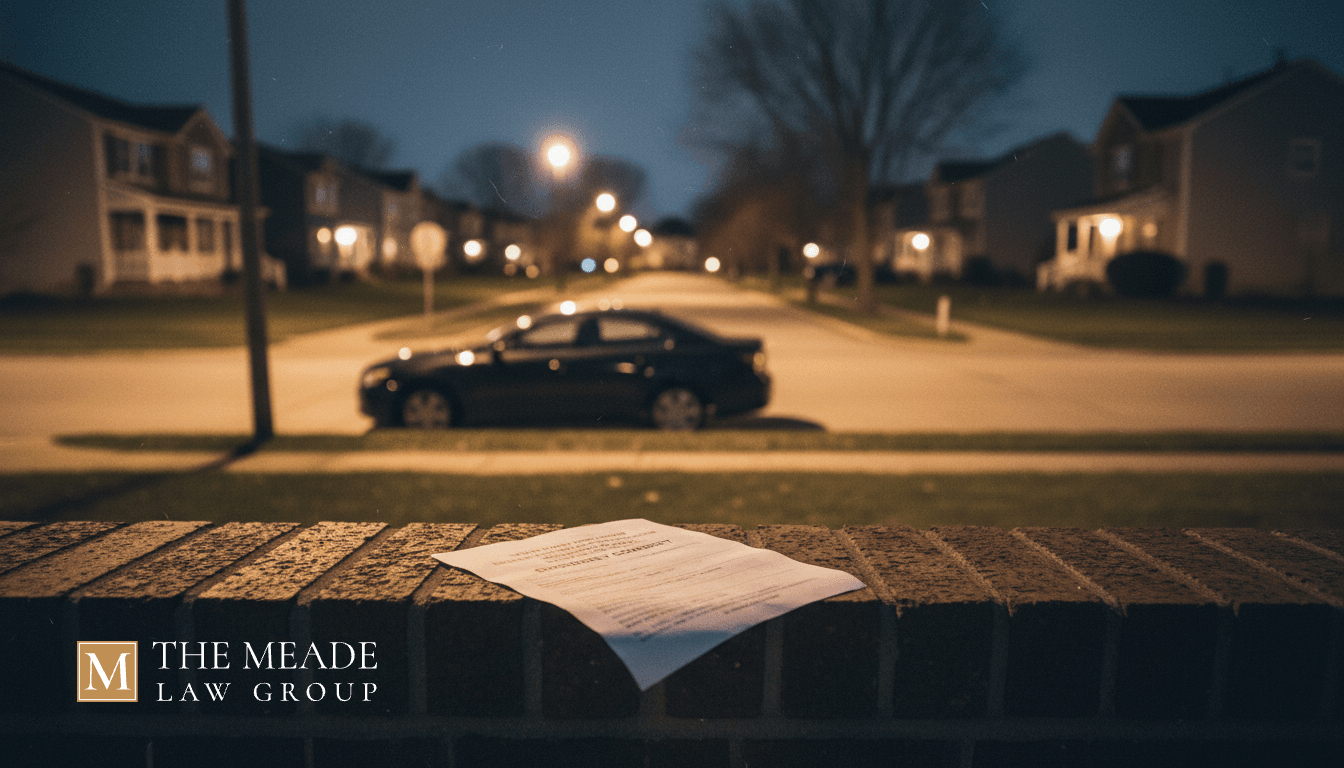Seeing flashing lights in your rearview mirror is a sinking feeling for any driver. When a traffic stop escalates into an arrest for Operating a Vehicle Under the Influence (OVI), that anxiety can quickly turn into overwhelming fear.
For many individuals, a first-time OVI in Ohio is their first true encounter with the criminal justice system. The uncertainty regarding your driver’s license, your employment, and your freedom can be paralyzing.
It is crucial to understand that while the situation is serious, it is not hopeless. Ohio’s drunk driving laws are strict, and the state moves quickly to penalize offenders, often suspending licenses before a conviction even occurs.
However, an arrest is not the same as a conviction. With a clear understanding of the legal landscape and the support of qualified counsel, you can navigate this challenging time and work toward a resolution that protects your future.
This guide offers a comprehensive overview of what you should expect during a first-time OVI case, covering the entire process.
What Is an OVI in Ohio?
A first-time OVI conviction in Ohio is a first-degree misdemeanor with severe mandatory penalties that cannot be expunged, making the conviction permanent.
Penalty Category | Low-Level BAC (0.08% – 0.17%) | High-Level BAC (0.17%+) or Test Refusal |
Jail Time | Minimum 3 days in jail OR completion of a 72-hour Driver Intervention Program (DIP). | Minimum 6 days in jail OR 3 days jail + 3-day DIP. |
Fines | Minimum $375 to Maximum $1,075. | Minimum $375 to Maximum $1,075. |
License Suspension | Mandatory suspension ranging from 1 to 3 years. | Mandatory suspension ranging from 1 to 3 years (Refusal may result in longer Administrative Suspension). |
Driving Privileges | Eligible for limited driving privileges after 15 days (for work/school/medical). | May be required to install an Ignition Interlock Device (IID) and yellow restricted license plates to obtain privileges. |
Other Consequences | Six points added to the driving record, permanent criminal record, mandatory alcohol/drug assessment. | Six points added to the driving record, permanent criminal record, mandatory alcohol/drug assessment, and potentially required IID and yellow plates. |
Administrative License Suspension (ALS)
This is a separate, immediate suspension imposed by the BMV upon arrest:
- Positive Test: 90-day suspension.
- Refusal to Test: 1-year suspension.
The court may allow you to obtain limited driving privileges during both the ALS and the court-imposed suspension, often requiring an Ignition Interlock Device for unlimited privileges.
What Happens Immediately After an OVI Arrest?
The sequence of events following an OVI stop is often a blur for defendants. Understanding the procedural steps police must follow can help you identify if your rights were violated at any point during the encounter.
The Traffic Stop and Field Sobriety Tests
Most OVI cases start with a routine traffic stop.
- Reasonable Suspicion: Law enforcement must have reasonable suspicion of a traffic violation (e.g., broken taillight, failure to signal, lane drifting) or criminal activity to initiate the stop.
- Cues of Impairment: Once stopped, officers look for signs of impairment, such as the odor of alcohol, slurred speech, glassy or bloodshot eyes, or fumbling with documents.
- Field Sobriety Tests (SFSTs): If impairment is suspected, the driver will be asked to exit the vehicle to perform Standardized Field Sobriety Tests.
The three standard tests sanctioned by the National Highway Traffic Safety Administration (NHTSA) are:
- Horizontal Gaze Nystagmus (HGN): The officer observes your eyes as they follow a stimulus (like a pen) to check for involuntary jerking.
- Walk-and-Turn: A “divided attention” test requiring you to walk heel-to-toe in a straight line while following instructions.
- One-Leg Stand: Requires you to balance on one foot while counting aloud.
It is important to note that you have the right to politely refuse these physical tests. Officers use the results of these tests to build “probable cause” to arrest you.
Performance on these tests is highly subjective and can be negatively impacted by nervousness, weather conditions, footwear, or physical health issues unrelated to alcohol.
Chemical Testing and Implied Consent
If the officer establishes probable cause for an OVI arrest, you will be asked to submit to a chemical test (typically breath, blood, or urine).
- Implied Consent: Ohio law includes “Implied Consent,” meaning that by driving on Ohio roads, you have consented to a chemical test if lawfully arrested for OVI.
- Refusal Penalties: While you have the right to refuse the test, this triggers immediate administrative penalties. Refusing results in an automatic, immediate suspension of your driver’s license, which is often longer than the suspension received for taking the test and failing.
The Arrest and Booking Process
If your BAC is above the legal limit (0.08% for adults, 0.02% for drivers under 21, and 0.04% for commercial drivers), or if the officer believes you are impaired despite a refusal, you will be charged. The arrest process involves:
- Transport: You will be handcuffed and taken to a police station or jail.
- Booking: Police will take your mugshot, fingerprints, and personal information.
- Release: Most first-time offenders are released either on their own recognizance (a promise to appear in court) or upon posting a bail bond. The court may impose conditions on your release, such as forbidding the consumption of alcohol.
Understanding the Administrative License Suspension (ALS)
One of the most immediate and disruptive consequences of an OVI charge is the Administrative License Suspension (ALS). This is a civil sanction imposed by the Ohio Bureau of Motor Vehicles (BMV), separate from the criminal case.
The ALS takes effect immediately if you:
- Refuse a chemical test.
- Take a test and register a BAC over the legal limit.
The Critical 10-Day Appeal Window
The time frame for challenging an Administrative License Suspension (ALS) is extremely narrow and must be treated with urgency.
- 10-Day Appeal Window: You must file an appeal for the ALS, which is your right to contest the automatic suspension, within 10 days of your arrest.
- Hearing Timing: This appeal hearing is typically held at your initial court appearance (arraignment) or shortly thereafter.
- Consequence of Waiving Rights: If you fail to request a hearing within this 10-day period, you waive your right to contest the suspension.
- Impact: Waiving this right can have devastating effects on your ability to:
- Commute to work.
- Attend school.
- Manage family responsibilities.
Key Legal Action: An experienced OVI attorney in Ohio will make filing this appeal a top priority to protect your driving privileges.
Hard Suspensions and Driving Privileges
Even if the suspension is upheld, you may be eligible for “limited driving privileges” for work, school, or medical appointments. However, Ohio law imposes a “hard suspension” period during which no driving is allowed, regardless of your needs.
- Failed Test: Typically a 15-day hard suspension.
- Refused Test: Typically a 30-day hard suspension.
Navigating the BMV procedures to reinstate your license or gain limited privileges is complex and often requires judicial approval.
The Ohio OVI Legal Process for First Offenders
Once the arrest is processed, your case enters the criminal court system. For a first-time OVI in Ohio, the process follows a specific trajectory, each stage offering an opportunity for defense.
The Arraignment Hearing
Your first appearance in court is the arraignment. The judge will formally read the charges against you and ask for your plea.
- Guilty / No Contest: You accept the penalties immediately. This is rarely recommended without legal counsel.
- Not Guilty: This is the standard plea at an arraignment. It denies the charges and preserves your right to review the evidence, file motions, and negotiate with the prosecutor.
At this hearing, the judge will also address bail conditions and your driver’s license status.
Pre-Trial Conferences and Negotiations
After a not-guilty plea, the case moves to the pre-trial phase. This is where the bulk of the legal work occurs. Your attorney will engage in “discovery,” requesting all evidence from the prosecution, including:
- Police reports and officer notes.
- Body camera and dashcam footage.
- Breathalyzer calibration logs and maintenance records.
- Witness statements.
During pre-trial conferences, your lawyer negotiates with the prosecutor. In some first-time cases, it may be possible to negotiate a plea bargain to a lesser charge, such as “Reckless Operation,” which carries less stigma and fewer penalties than an OVI.
Filing Motions to Suppress Evidence
A “Motion to Suppress” is a powerful tool in OVI defense. It is a formal request asking the court to exclude specific evidence because it was obtained in violation of your constitutional rights or proper procedure.
Common grounds for suppression include:
- Lack of Probable Cause: The officer did not have a valid legal reason to stop your vehicle or detain you.
- Improper FST Administration: The officer failed to give proper instructions or conduct the field sobriety tests according to NHTSA standards.
- Testing Errors: The breathalyzer machine was not calibrated correctly, or the sample was not collected within the legally required timeframe (often 3 hours).
If the judge grants a motion to suppress, the prosecution may lose key evidence (like the breath test result), often leading to a dismissal or a significantly reduced charge.
Trial and Sentencing
If no plea agreement is reached and the charges are not dismissed, the case proceeds to trial. You have the right to a trial by a jury of your peers or a bench trial (decided by a judge). The prosecution bears the burden of proving guilt “beyond a reasonable doubt.”
If convicted, the judge will impose a sentence based on Ohio’s mandatory sentencing guidelines for OVI.
Penalties for a First-Time OVI in Ohio
Ohio law takes a firm stance on drunk driving. Even for a first offense, the penalties are mandatory and non-negotiable in many aspects. The state legislature has removed much of the judge’s discretion regarding minimum punishments to ensure consistency and deterrence. Ohio’s OVI laws, primarily outlined in Ohio Revised Code Section 4511.19, establish a clear framework for these penalties.
Mandatory Minimum Sentencing
The following table outlines the standard penalties for a first-time OVI conviction involving a “low tier” test result (BAC .08% to .169%) or no test result (but not a refusal):
Penalty Type | Mandatory Minimum | Maximum Potential |
Jail Time | 3 Days (72 Hours) or DIP* | 6 Months |
Fines | $375 | $1,075 |
License Suspension | 1 Year | 3 Years |
Probation | Determined by Court | Up to 5 Years |
Note on Jail Time: The mandatory 3-day jail sentence can often be satisfied by completing a certified 72-hour Driver Intervention Program (DIP). This is a residential education program focused on alcohol and drug awareness.
Aggravating Factors and Enhanced Penalties
Penalties increase significantly if “aggravating factors” are present.
- High BAC (0.17% or higher): If your chemical test result is in the “high tier,” the mandatory jail time doubles to 6 days (or 3 days jail + 3 days DIP). You may also be required to obtain yellow “party plates” for your vehicle.
- Refusal with Prior Record: While this guide focuses on first offenses, if you have a prior refusal within 20 years, penalties escalate.
- Minors in the Vehicle: Driving impaired with a child under 18 in the car allows prosecutors to upgrade the charge, potentially to a felony level, increasing prison exposure and fines.
Collateral Consequences of a Conviction
Beyond the immediate court penalties, an OVI conviction creates a permanent criminal record. This can have long-lasting effects on your life, including:
- Insurance Rates: Premiums often skyrocket or policies may be canceled entirely (requiring SR-22 insurance).
- Employment: Many employers conduct background checks. A criminal driving offense can disqualify you from jobs involving driving, heavy machinery, or positions requiring high security clearance.
- Professional Licenses: Nurses, doctors, pilots, and CDL holders may face disciplinary action from their licensing boards.
- Travel Restrictions: Canada and other countries may deny entry to individuals with DUI/OVI convictions.
Possible Defenses for First-Time OVI Charges
Many people assume that failing a breath test makes a conviction inevitable. This is incorrect. OVI cases are highly technical, and there are numerous legitimate defenses that can be raised.
Challenging the Initial Traffic Stop
The Fourth Amendment protects you from unreasonable search and seizure. If the officer lacked a valid reason to pull you over, all evidence gathered after the stop (including the breath test and your admission of drinking) may be deemed “fruit of the poisonous tree” and suppressed.
Contesting Field Sobriety Test Results
Field Sobriety Tests are not pass/fail in the scientific sense; they are designed to gather evidence against you. However, they are often administered improperly.
- Did the officer explain the instructions clearly?
- Was the ground level dry?
- Do you have physical injuries (knees, back, ankles) that prevent you from balancing on one leg?
- Were you wearing high heels or restrictive clothing?
Video evidence from body cams often contradicts the officer’s written report, revealing that a defendant performed much better than claimed.
Disputing Chemical Test Reliability
Breathalyzer machines are sensitive instruments that require strict maintenance. A skilled attorney can examine the machine’s calibration logs (“checks”) to ensure it was working properly.
Furthermore, human error such as an officer not observing you for the required 20 minutes before the test to prevent “mouth alcohol” contamination can invalidate the result.
How an Ohio OVI Attorney Can Help You
Hiring a dedicated OVI attorney is crucial because they shift the balance of power against the prosecution, whose goal is securing a conviction.
Protecting Your Rights and Record
- Acts as a Shield: The attorney ensures you are not pressured into an unfair plea deal.
- Handles Communication: They manage all communication with the court and prosecution, preventing you from making accidental incriminating statements.
- Scrutinizes Evidence: Their primary goal is to find cracks in the state’s case by examining every piece of evidence.
Navigating Complex Legal Procedures
- Manages Deadlines: They handle strict deadlines, like the 10-day ALS appeal and discovery motions, preventing the automatic loss of rights.
- Tailors Defense Strategy: They know the specific tendencies of local judges and prosecutors in Columbus and surrounding counties, allowing them to craft a jurisdiction-specific defense.
- Minimizing Impact: They fight to reduce the penalty by:
- Negotiating a Driver Intervention Program instead of jail time.
- Arguing for limited driving privileges to preserve your employment.
The Meade Law Group Difference
If you are facing an OVI charge in the Columbus, Ohio area, or have other criminal defense concerns, we invite you to reach out to our experienced former prosecutors at The Meade Law Group.
Navigating the complexities and severe penalties of Ohio OVI laws requires legal experience. At The Meade Law Group, we help clients:
- Challenge the Legality of the Stop and Arrest: Scrutinizing the initial traffic stop, Field Sobriety Tests (SFSTs), and Probable Cause to find grounds for dismissal.
- Attack Chemical Test Results: Challenging the accuracy and proper calibration of breathalyzers or the handling of blood/urine samples.
- File the Critical ALS Appeal: Immediately working to appeal the Administrative License Suspension to protect your driving privileges within the vital 10-day window.
- Negotiate Reduced Charges and Penalties: Advocating for outcomes like a reduction to “Physical Control” or securing a Driver Intervention Program (DIP) instead of jail time.
We are here to provide the guidance, legal defense, and strategic insight needed to achieve the best possible outcome for your OVI case.


